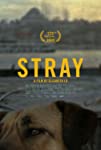Eye For Film >> Movies >> Stray (2020) Film Review
Stray
Reviewed by: Amber Wilkinson

There's a philosophical air to Elizabeth Lo's feature debut documentary that doesn't just stem from the intertitle cards bearing dog/human quotes from the likes of Diogenes. Although her focus is on the strays that roam the streets of Istanbul - once exterminated in large numbers by the government but now, following years of protest, ear-tagged and left to do their own thing - the wider human world is reflected through the prism of the dog's domain.
The chief dog in question is Zeytin. Described early in the film by a passer-by as "beautiful", it's hard to argue with the sentiment. There's a statuesque quality to this tan hound and, for the most part, an astounding level of tranquility that sees her unphased by everything from the attention of toddlers to cars whizzing just inches from her as she lazes by the road. Ceyda Torun previously got down to Istanbul street level with cats in KEDi and Stray joins a pack that also contains Space Dogs and Los Reyes, to consider dogs that roam the streets. Here we don't so much look at the world from Zeytin's perspective but take a good sniff at it to see what's good and bad - the sense of her picking up scents central from the start. Lo goes roving with Zeytin, sometimes watching from a distance, sometimes catching her more close at hand, charting some of her daily encounters with humans in the city but also her interactions with other dogs, both strays, including a regular pal Zahar, and more pampered pooches with collars and raincoats and a home to go to.

While the focus is generally on Zeytin, Lo sometimes tunes in to conversations around her - a man berating a woman over accepting a casual male friend's contact on Instagram, a woman talking to a pal about her love life, gradually building a patchwork picture of the city. We are also introduced to a group of kids who love Zeytin and her friends and share their homelessness. Refugees from Syria and none of them seemingly older than teenage, these boys are also looking for any comfort they can on the streets, selling tissues and begging by day and huffing glue and hunting for shelter at night.
Humanity is here in all its facets. We see the boss and workers at a construction site feeding the dogs on a nightly basis - their attention grabbed by a litter of puppies, including cutie Karlan, who has also caught the eye for the refugee kids. There's no escaping the depressing contrast between their care for the dogs and the perfunctory shooing away that they give the kids who have holed up there for the night - you have to wonder whether, were it not for the presence of Lo's camera, the situation for the youngsters might have been even worse. We are also called to question our perspective, just as some assume Zeytin may be aggressive, when she seems anything but around humans, there's also a sense of the prejudice the young refugee kids are facing.
This is not a negatively geared film, however, with Lo also capturing more positive instincts - the way a binman insists that dogs share bones, volunteers coming to hand out food to the homeless and, perhaps most heartbreakingly, the children giving the lion's share of what they get with to four-legged chums. Although not overtly political, just as the dogs have roamed the streets for decades, there's a reminder that the plight of refugees is nothing new either - when we see the youngsters encounter some men on a boat who explain they previously fled their Cechen and Turkmen homelands. Lo's film gently asks all of us whether our consideration of others less fortunate would pass the sniff test.
Reviewed on: 06 Oct 2020

















